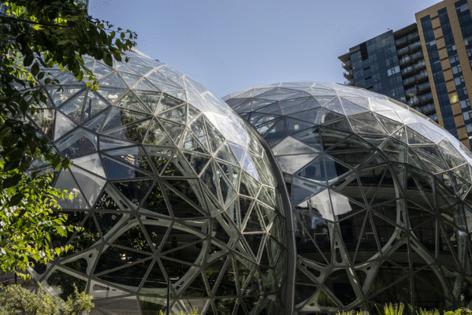Amazon wielded 'overwhelming' control over contract workers, labor board tells judge
Published in Business News
Amazon.com Inc. exercised “overwhelming control” over subcontracted drivers it claimed weren’t its employees, U.S. labor board attorneys told a judge Monday.
“Amazon structured its logistics network to maintain all the benefits of control while denying any responsibility as an employer,” Sanam Yasseri, a lawyer for the general counsel of the National Labor Relations Board, told an agency judge during opening statements at a hearing in Los Angeles. “It controls every minute of the drivers’ day.”
The judge is considering labor board prosecutors’ claims that Amazon was legally the boss of a group of subcontracted drivers in Palmdale, California, and that the e-commerce giant violated federal labor law by making illegal threats and refusing to negotiate after those workers organized with the Teamsters union in 2023.
Amazon has denied wrongdoing, and has maintained that it is not the employer of its contract drivers, who are hired via third-party firms it calls delivery service partners, or DSPs.
While the case involves a small group of drivers at a contractor Amazon has stopped working with, a ruling in the Teamsters’ favor could help establish a precedent and encourage unionization at the company. Delivery workers are responsible for a crucial aspect of Amazon’s business, and by not directly employing them, the company has shielded itself from costs and liabilities associated with their work.
The Teamsters have mounted organizing campaigns among several groups of contract drivers, part of a larger, hard-fought effort to unionize Amazon’s operations. Under President Joe Biden, labor board prosecutors deemed Amazon a “joint employer” of the Palmdale workers. The designation means that a company has enough control over workers’ conditions to be considered legally responsible if they’re mistreated, and to be obligated to negotiate if they unionize.
President Donald Trump fired Biden’s NLRB general counsel, Jennifer Abruzzo, in January, saying he wasn’t confident she could treat employers fairly. But the agency’s current top prosecutor — William Cowen, tapped by Trump to replace Abruzzo on an acting basis — has forged ahead with the Palmdale case, accusing Amazon of violating the 1935 National Labor Relations Act.
In an opening statement, Amazon attorney Brian Stolzenbach said the complaint should be dismissed because the Seattle-based company didn’t violate the act.
Stolzenbach suggested the agency was using the case to advance a broader agenda, telling the judge that Amazon doesn’t intend to produce documents regarding whether the company is a joint employer. He described the subpoena requests on that topic as a “fishing expedition,” pursued “for reasons unrelated to the case itself.”
“Amazon is not going to participate in the misuse of the NLRB’s processes,” Stolzenbach said.
Yasseri, the general counsel’s attorney, said Monday that DSPs “are essentially captive delivery companies created at the direction and assistance of Amazon.” They’re required to comply with terms and conditions “unilaterally drafted” by the company and to “collect data from drivers for Amazon’s review and monitoring,” she said.
Amazon required that the Palmdale drivers “be trained by Amazon and strictly abide by Amazon’s policies,” she told the judge, and the retailer was “determining and controlling the workers’ wages, benefits, hours of work and work schedule,” as well as making decisions about disciplining or terminating staff.
The drivers worked “under the constant monitoring and daily critique of Amazon,” she said.
In an email Monday, Amazon spokesperson Eileen Hards said the company looks forward to demonstrating that the allegations against it have “no merit.”
Bloomberg News reported in 2021 that Amazon imposes extensive rules on contract drivers, including policies requiring “clean teeth, face/ears, fingernails and hair” and prohibiting “obscene” social media posts. Contract delivery firms are required to adhere to Amazon’s rules, which the company can unilaterally change at its discretion.
The businesses also must provide the retailer with physical access to their premises and information such as geolocation data, speed and movement of the drivers, according to a contract reviewed by Bloomberg at the time.
Forcing Amazon to collectively bargain with delivery drivers would remain challenging even if the company were found legally to be their boss, as shown by the struggles unions have had trying to organize the company’s direct employees in its warehouses. The NLRB lacks authority to make companies pay punitive damages for violations, but it can order them to change policies, collectively bargain with unions or reinstate fired workers.
Rulings by agency judges can be appealed to the labor board’s members in Washington, DC, where Republicans may soon hold a majority if Trump’s nominees are confirmed — and from there to federal court. Trump fired one of the labor board’s Democratic members, Gwynne Wilcox. Though a federal district judge subsequently ruled her termination illegal, an April order from Chief Justice John Roberts let Trump temporarily oust her while litigation continues.
Trump’s nominee to be the agency’s permanent general counsel, Crystal Carey, is a partner at a leading law firm that has been representing employers such as Amazon, as well as Elon Musk’s Tesla Inc. and SpaceX, in labor disputes. The Teamsters, who have proven influential in other Trump personnel decisions, have denounced his choice of Carey. If confirmed, she would have the opportunity to withdraw, amend or settle cases brought by her predecessors.
_____
©2025 Bloomberg News. Visit at bloomberg.com. Distributed by Tribune Content Agency, LLC.












Comments